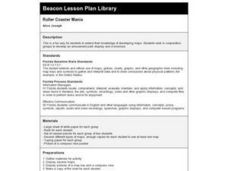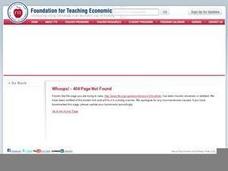Curated OER
Which Shall We Pick?
Students compare and contrast the value of different organizations in their community. They listen to subjective and objective perspectives to make a decision. They use the decision-making process to decide which organization needs...
Curated OER
A Constitution for Alaska
Middle schoolers read sections cited from the Governing Alaska unit. They discuss factors that made Alaskans push for statehood. They view video A Constitution for Alaska.
Curated OER
Roller Coaster Mania
Fifth graders extend their knowledge of developing maps. They work in cooperative groups to develop an amusement park display and a brochure.
Curated OER
We Accuse Colored Peoples of California V. State of California
Students participate in a WebQuest to investigate discrimination of African Americans, Chinese and Californio/Latino during the Gold Rush era. They act as law clerks to write a letter to their clients about a potential trial.
Curated OER
Iowa Agriculturist
Tenth graders review the Iowa Agriculturist, retell the annual and seasonal cycle of farming and describe pioneer farming practices.
Curated OER
Religion in Southeast Asia: Becoming Familiar with Buddhism Through Jataka Tales
Students study basic Buddhist concepts by reading Jataka tales in this unit. They write personal response and identify connections to Buddhist literature and culture.
Curated OER
Couch Potatoes Around the World#138
Students identify potato chips as a consumer product and investigate what processes are needed to make the chips. They investigate where the potatoes are grown and harvested before being made into chips at a processing plant. They make a...
Curated OER
Mental Maps
Middle schoolers analyze and evaluate how they mentally organize information. They participate in a visualization exercise, create a sketch of a mental map of their neighborhood, state, country, and the world, and complete a Mental Map...
Curated OER
Economics: Who Benefits from Competition?
Students examine competitive markets and complete a simulation called "The More. the Merrier." In the simulation they assess how goods are more available when competition increases. Students investigate how competition and the opening of...
Curated OER
Challenging Regional Stereotypes
High schoolers analyze the regional stereotypes that exist in Whales and formulate personal opinions about these views. Students discuss the impact of adjectives used to describe people from different regions of the U.K.
Curated OER
Economic Forces
Young scholars explore the economic forces of scarcity and choice. They examine how these forces affect the management of personal financial resources, shape consumer decisions, and the economic well-being of society. Students research...
Curated OER
Civil Society in Iraq
Students use core questions to learn about the concept of a civil society. The dynamics of the war in Iraq serve as an example of a society that is in turmoil. They also develop an imagined society organization that would help promote...
Curated OER
Simple Everyday Products
Fourth graders investigate the origin of products and how they are manufactured from natural resources. They draw the production cycle and discuss how one could help reduce the number of natural resources that are used. They also...
Curated OER
ASTHMA POSTER CAMPAIGN
Students examine the condition, triggers, and ways to cope with asthma, compare their previous knowledge of asthma with new information presented in an educational video, and use information about asthma to the creation of an asthma...
Curated OER
Look At Those Leaves!
Young scholars collect, observe, sort, and measure leaves. In this leaf lesson plan, students take a walk to collect leaves. They bring the leaves back into the classroom to observe, sort, and measure them. They visit a website to learn...
Curated OER
I Have a Metaphor
Learners locate the literary devices used in Martin Luther King Jr.'s "I Have a Dream" speech. In this figurative language lesson plan, young scholars first distinguish between similes, metaphors, analogies, personification, etc....
Curated OER
The House of Dies Drear
Learners read The House of Dies Drear and understand how he filled a need and helped people. In this philanthropy lesson students understand how the people who helped on the "Underground Railroad" filled a need and helped others....
Curated OER
Close Encounters
Young scholars investigate the cause of death of a fictitious school janitor. They develop hypotheses based on information discovered by examining the labels of household chemicals.
Curated OER
My Secret War: Lesson 5
Fifth graders determine how freedom comes with rights and responsibilities through literature and poetry about World War II. In this World War II lesson, 5th graders use the letters in the word "infamy" to write an acrostic poem. They...
Curated OER
Diseases Are Real
Eleventh graders research industries that contribute to sanitation and pollution problems. They investigate the direct result of unhygienic practices including disease outbreaks or specific illnesses. They create a Power Point...
Curated OER
The Electronic Exit Portfolio (EEP)
Here's a fresh take on the student writing portfolio. Consider having learners create an electronic portfolio. After examining sample e-portfolios, class members explore various software programs they will use throughout the course and...
Curated OER
Tech: Medical Forensics
High schoolers explore what it takes to be a forensic scientist or pathologist. They view a PowerPoint, discuss what education and skills are needed to succeed as a pathologist. They play a game to test their observation skills, a skill...
Curated OER
Rosa Parks
Students examine the actions of Rosa Parks. They identify the reasons why philanthropy is good for the community and individuals. They write a letter to someone they admire because of their qualities.
Curated OER
Exposes in Different Eras: The Work of Dorothea Dix and Burton Blatt
Young scholars discover that Dorothea Dix was the first to make the pubic aware of the terrible living conditions of people with mental illness in the 1800's. They evaluate the influence of citizen action on public policy.

























